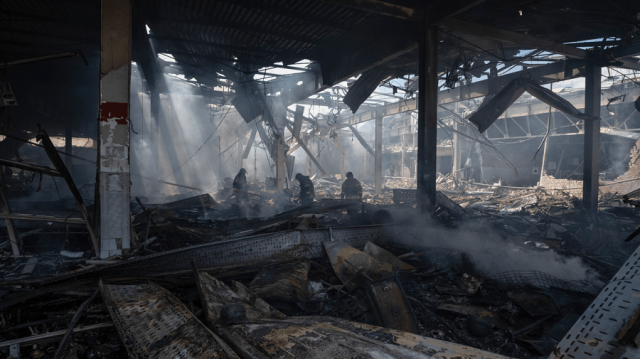
Ukrainian forces pushed into Russia this week to attack a border region in a stunning counteroffensive that comes after Kyiv has been largely on the defensive for the past year and a half.
The Ukrainian attack, the first from a foreign nation on Russia’s European soil since World War II, has set off an emergency in the Kursk region bordering Ukraine’s northeastern Sumy province.
Ukrainian troops and armored vehicles have advanced at least 20 miles and are continuing to press deeper into Kursk on the fourth day of battle, capturing dozens of Russian border guards, taking several towns and surrounding the city of Sudzha, where fighting continues.
The surprise attack has infuriated Russian President Vladimir Putin, who called the incursion a “major provocation,” sparking fears of a potential Kremlin escalation not only in the war against Ukraine, but also with the U.S., the primary supporter of Kyiv.
Although it’s unclear how the offensive will proceed, Ukraine has successfully changed the narrative of the war by breaking into Russia, said Alena Kudzko, vice president for policy and programming at the think tank GLOBSEC.
“Ukrainians are trying hard to change the narrative of the war. Before [Kursk], there was a feeling that the war has become rather predictable, and on many sides, the war was already perceived as frozen,” she said. “By doing this attack, Ukraine actually has managed to demonstrate that there’s really space for making this war unpredictable, that there’s space for surprising Russia.”
The Kursk offensive is reminiscent of the 2022 Kharkiv and Kherson counteroffensives, in which high-speed Ukrainian maneuvers caught Russia by surprise.
U.S. officials have supported Ukraine’s attack. Pentagon deputy press secretary Sabrina Singh on Thursday told reporters Kursk was consistent with Washington’s policy to defend against Russian border attacks and not an escalation in the war.
“We don’t feel like this is escalatory,” she said. “Ukraine is doing what it needs to do to be successful on the battlefield.”
Kyiv has struggled to fend off Russian attacks for months across the 600-mile front line, in a grinding war of attrition that has favored a larger Russia.
Even with the Kursk offensive, Russian forces are continuing to attack their primary targets, in the northeastern Kharkiv region that neighbors Sumy and in the eastern Donetsk province.
Russian troops have made slow and incremental gains, but are still pushing toward key objectives, including the key Donetsk city of Chasiv Yar. Seizing that city could give Moscow the high ground and allow for a push toward the twin cities of Sloviansk and Kramatorsk, which have long been in Russia’s sights in the goal to capture all of Donetsk.
Russia’s Kharkiv offensive is also continuing, though its troops have yet to capture the town of Vovchansk that would open the way to the city of Kharkiv and appear to be slowing down in the offensive.
Ukraine’s incursion has put pressure on Russia to divert troops and defend its borders, said Federico Borsari, a fellow with the transatlantic defense and security program at the Center for European Policy Analysis.
“It’s now up to the Russians what they want to do with this offensive in Kursk,” he said. “I think the Russians will try to beat the pressure, even though this means [possibly] giving Ukraine some options elsewhere.”
Still, he added it wasn’t clear yet at this stage whether the attack would have any dramatic effect on the front lines, where Ukraine remains on its back foot, trying to fend off Russian attacks with depleting manpower.
While months of delays of U.S. aid damaged Ukraine’s defenses, billions of dollars of American weapons and equipment are now pouring onto the battlefield.
New weapons include F-16s, a small batch of which arrived in Ukraine this week to help defend the skies. Air superiority is crucial to high-speed maneuver warfare, but it’s not clear if F-16s have been used or were part of the calculation in Kursk.
The aid has not addressed all of Ukraine’s defensive problems. And while Ukraine has lowered its draft age from 27 to 25 — which allows it to call up more troops — it won’t solve a severe manpower shortage for months or longer.
The Kursk offensive is likely an effort to offset those difficulties, said Rafael Loss, a policy fellow at the European Council on Foreign Relations.
“The most significant problem for Ukraine at this moment is manpower,” he said. “Maybe news about a daring maneuver could motivate some more Ukrainian volunteers to sign up. I’m not sure it’s going to be fundamentally changing individuals’ risk calculus, but it might start to change the tone of the discussions around volunteering.”
High-ranking Ukrainian officials have not acknowledged any attack in Kursk, though Ukrainian President Volodymyr Zelensky and his advisers have made cryptic messages all but confirming it.
“War is war, with its own rules, where the aggressor inevitably reaps corresponding outcomes,” wrote Mykhailo Podolyak, a top adviser to Zelensky, on the social platform x.
Ukraine appears to be attacking in two main directions: toward Sudzha and another district just west, Korenevsky. But troops appear to be buzzing around several parts of the region and forcing Russia to respond in multiple arenas.
Ukraine will now have to face what it does with the territory it holds in Russia and whether that distracts from defensive efforts on the front lines.
Tomasz Blusiewicz, a research fellow at Stanford University’s Hoover Institution, said Ukraine is likely to withdraw from Kursk, but only after forcing Russia to move multiple brigades, which would exploit positions on the frontline.
“Now they have to move. And the Russians are bad at this. They are bad at logistics,” he said. “It was a brilliant move by Ukraine. … They have already achieved a huge success by forcing Russia to move its troops, by demonstrating that Russia is defenseless in other areas. It’s a huge prestige blow to Putin.”
Russia has sent reinforcements to Kursk and is vowing it will succeed in repelling Ukrainian forces.
Maj. Gen. Apty Alaudinov, Russia’s deputy head of the main military-political directorate, told state-run news agency TASS that “the situation is hard, but it is not critical” in Kursk and that Ukraine could not avoid an inevitable collapse on the front lines.
“The enemy can be stopped and destroyed,” he said. “As soon as we destroy these resources, I am more than sure that the enemy will have nothing to counter us with.”
Rather than hold territory, Ukraine’s plan may be to attack strategic resources in Russia, including equipment and areas used to mount attacks. Capturing prisoners and territory can also be used in negotiations and prisoner swaps.
Ukrainian forces also seized a gas metering station in Kursk and have threatened a nearby Russian nuclear power plant.
Brock Bierman, visiting senior fellow at the German Marshall Fund, said the offensive was strategic in targeting a region of Russia with important assets that Ukraine can destroy and remove as a threat.
It’s also “a way to disperse the front lines” and force Russia to “reallocate resources” to protect its assets, he added.
“Now they’re going to have to think about how that allocation is, not only in that particular region, but along a very, very long border,” he said.
The Kursk offensive has forced Russian citizens to face the direct consequences of the war. Before the attack, Ukraine’s strikes into Russia were limited to the occasional drone attack on oil depots or strategic assets. They have in the past few months begun using American-made weapons, including long-range artillery, to hit targets near the border.
But now, Russians in Kursk have been forced to evacuate their homes and several people have been killed.
The war has already been costly for Russian forces, with more than 1,000 casualties in May and June, according to the U.K. Ministry of Defense.
Some Russians have blamed the government and military for failing to anticipate the Kursk attack or adequately defending against the incursion.
Russian military blogger Rybar, who closely supports the Russia’s military goals and is a retired press officer in the Kremlin, faulted Moscow because Ukraine had been “accumulating forces for months.”
“For two months, all the information was sent to useless higher headquarters. There was enough time to make an appropriate decision,” Rybar said in a Telegram post. “The price of this is the forces of the Ukrainian formations that entered Sudzha and Korenevo.”
Putin retains a tight grip on his country and dissent is generally crushed. But the Kursk attacks threaten to unravel his narrative that the war is under control.
Kudzko, from the GLOBSEC think tank, said she didn’t expect any big domestic changes in Russia but also stressed it would add more pressure on the Kremlin.
“There will be more dissatisfaction among the population against the Kremlin and against the government,” she said. “Even the people who, in principle, say we support the war, would not be happy about the consequences of this war on their lives.”



